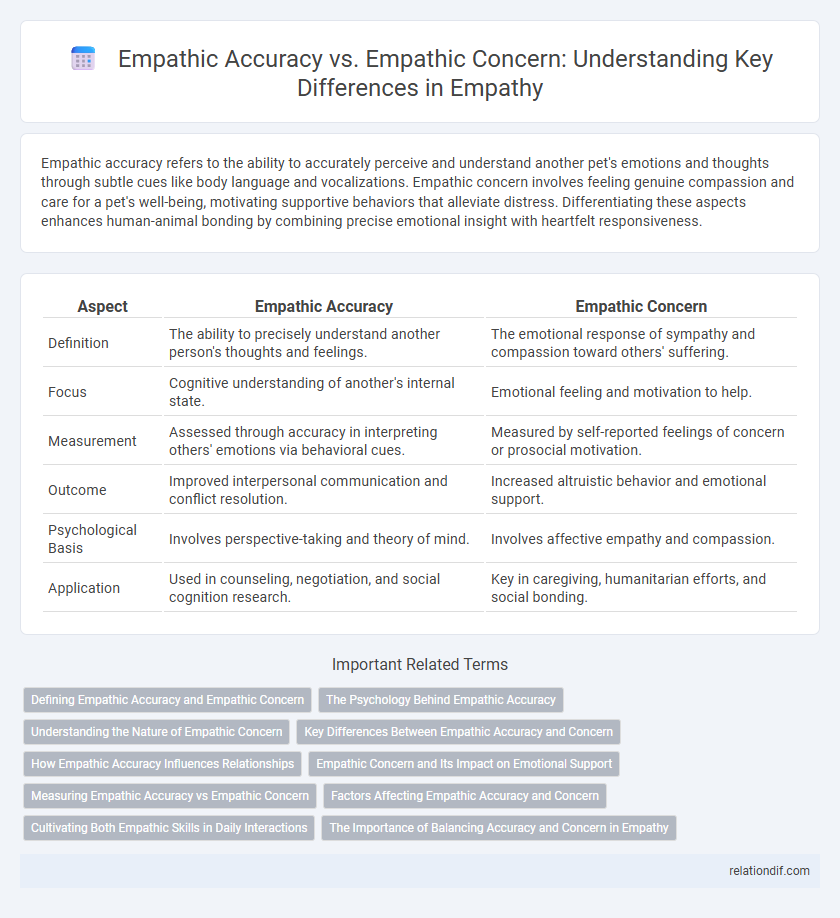Empathic accuracy refers to the ability to accurately perceive and understand another pet's emotions and thoughts through subtle cues like body language and vocalizations. Empathic concern involves feeling genuine compassion and care for a pet's well-being, motivating supportive behaviors that alleviate distress. Differentiating these aspects enhances human-animal bonding by combining precise emotional insight with heartfelt responsiveness.
Table of Comparison
| Aspect | Empathic Accuracy | Empathic Concern |
|---|---|---|
| Definition | The ability to precisely understand another person's thoughts and feelings. | The emotional response of sympathy and compassion toward others' suffering. |
| Focus | Cognitive understanding of another's internal state. | Emotional feeling and motivation to help. |
| Measurement | Assessed through accuracy in interpreting others' emotions via behavioral cues. | Measured by self-reported feelings of concern or prosocial motivation. |
| Outcome | Improved interpersonal communication and conflict resolution. | Increased altruistic behavior and emotional support. |
| Psychological Basis | Involves perspective-taking and theory of mind. | Involves affective empathy and compassion. |
| Application | Used in counseling, negotiation, and social cognition research. | Key in caregiving, humanitarian efforts, and social bonding. |
Defining Empathic Accuracy and Empathic Concern
Empathic accuracy refers to the ability to accurately perceive and understand another person's thoughts, feelings, and intentions through subtle behavioral cues. Empathic concern involves an emotional response of compassion and care towards others, motivating prosocial behavior and support. While empathic accuracy is cognitive and focused on interpretation, empathic concern is affective and centered on emotional connection.
The Psychology Behind Empathic Accuracy
Empathic accuracy involves accurately perceiving and understanding another person's thoughts and feelings, a process rooted in cognitive perspective-taking and theory of mind. This psychological skill relies on interpreting verbal and nonverbal cues to decode emotional states, enhancing interpersonal communication and social bonding. Neuroscientific studies highlight the role of the medial prefrontal cortex and temporoparietal junction in underpinning empathic accuracy, distinguishing it from affective components like empathic concern.
Understanding the Nature of Empathic Concern
Empathic concern involves experiencing feelings of compassion and care for others, motivating prosocial behavior and emotional support. Unlike empathic accuracy, which refers to the precise cognitive ability to understand another's thoughts and emotions, empathic concern is rooted in affective responses aimed at promoting others' well-being. This distinction highlights how empathic concern drives emotional engagement rather than objective understanding.
Key Differences Between Empathic Accuracy and Concern
Empathic accuracy refers to the precise ability to accurately perceive and understand another person's thoughts and feelings, while empathic concern involves feeling compassion and care for others' emotional states. Empathic accuracy is cognitive and based on accurate interpretation of emotional cues, whereas empathic concern is affective, driven by emotional resonance and motivation to help. These key differences highlight how empathic accuracy focuses on understanding, whereas empathic concern emphasizes emotional connection and prosocial response.
How Empathic Accuracy Influences Relationships
Empathic accuracy, the ability to precisely infer others' thoughts and feelings, enhances communication and strengthens trust in relationships by enabling partners to respond appropriately to each other's needs. High empathic accuracy reduces misunderstandings and emotional conflicts, fostering deeper emotional intimacy and resilience in couples. Research in social psychology consistently shows that empathic accuracy predicts relationship satisfaction and stability better than empathic concern alone.
Empathic Concern and Its Impact on Emotional Support
Empathic concern, characterized by feelings of compassion and care for others, plays a crucial role in providing effective emotional support by motivating prosocial behaviors and fostering deeper interpersonal connections. Unlike empathic accuracy, which involves correctly perceiving others' emotions, empathic concern drives supportive actions that enhance emotional well-being and resilience. Research shows that higher levels of empathic concern correlate with greater responsiveness and comfort offered during times of distress, strengthening social bonds and mental health outcomes.
Measuring Empathic Accuracy vs Empathic Concern
Empathic accuracy is measured by an individual's ability to correctly infer another person's thoughts and feelings, often assessed through tasks requiring interpretation of verbal and nonverbal cues. Empathic concern is quantified by evaluating the extent of feelings of compassion and care towards others, typically using self-report scales like the Interpersonal Reactivity Index. Differentiating between these constructs involves combining objective performance metrics for empathic accuracy with subjective reporting tools to capture empathic concern.
Factors Affecting Empathic Accuracy and Concern
Empathic accuracy is influenced by cognitive abilities such as perspective-taking, attention to social cues, and emotional intelligence, while empathic concern is shaped by personality traits like compassion, agreeableness, and moral values. Situational factors such as the relationship closeness, emotional expressiveness of others, and cultural norms also significantly impact both empathic accuracy and concern. Neurobiological mechanisms involving the mirror neuron system and brain regions like the anterior insula and medial prefrontal cortex play a crucial role in modulating these empathy components.
Cultivating Both Empathic Skills in Daily Interactions
Empathic accuracy, the ability to accurately perceive others' emotions, complements empathic concern, which involves feeling compassion and care for others. Cultivating both skills in daily interactions enhances emotional intelligence and strengthens interpersonal relationships by fostering understanding and genuine support. Practicing active listening and perspective-taking exercises helps develop these parallel empathic abilities for more meaningful connections.
The Importance of Balancing Accuracy and Concern in Empathy
Empathic accuracy involves precisely understanding another person's emotions, while empathic concern reflects the emotional response and care for their well-being. Balancing these aspects is crucial, as high accuracy without genuine concern can seem cold, whereas strong concern without accuracy may lead to misinterpretations and ineffective support. Integrating accurate emotional insight with compassionate response enhances interpersonal relationships and fosters deeper emotional connection.
Empathic Accuracy vs Empathic Concern Infographic

 relationdif.com
relationdif.com